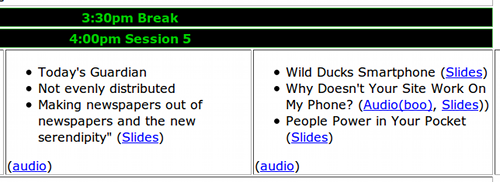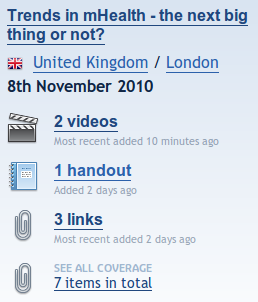Oh! Woe is me! I can't make BarCampLondon 8. This will be the first BarCamp I've not been able to get to in ages. Following hashtags is fun, if a little disjointed. What I really need is some way I could attend virtually.....


Does It Need To Be So Hard?
We don't need expensive crews. We have each other! The very idea of BarCamps is that they should be self-organised. So, if you're going to BCL8 this year, here's what I would like you to do...
- Got a smartphone or a flip camcorder? Video the sessions you're in.
- Got a less-than-smart-phone or a dictaphone? Record the audio of the sessions you run or participate in.
- Got neither? Offer to hold someone else's tech while they present.
Before long, every single session will have coverage of some kind and us poor sods who can't make it will still be able to vicariously share in the pleasure of London's greatest Unconference.
Video
There are loads of places to stick video up on the web. But most services have time and size restrictions or want you to pay to store your video. YouTube is limited to 15 minutes (no good for 30 minute BarCamp sessions) and Vimeo is limited to 500MB per week (no good if you've filmed in HD).
Here are two free services which I think will suit the BarCamp Crowd.
Archive.org
Archive.org is
building a digital library of Internet sites and other cultural artifacts in digital form. Like a paper library, we provide free access to researchers, historians, scholars, and the general public.
I believe this to be the best place to store the record of our culture. Here's a video of me running a session at BarCamp Brighton. The video is hosted by Archive.org and can be downloaded in several formats.
Videos can be any length and any format. They'll be transcoded to MP4 and Ogg Video. Best of all, video can be uploaded via FTP - which makes queuing large uploads very easy. You can, of course, upload via your browser.
One point to note, videos have to be CreativeCommons or Public Domain.
There are already around 40 BarCamp videos on Archive.org.
Qik
If you have the bandwidth, Qik is the ideal place to stream and store video. I've found the application can be a little hit-and-miss - especially if WiFi coverage gets congested. Here's my presentation from BarCamp Transparency.
Streaming Services
There are loads of sites which will let you stream video from your laptop's webcam. Please - whatever service you use - make sure that it is also recording the stream. It greatly saddens me that the presentations from awesome events like CharityHackDay are lost forever. They were streamed and then promptly vanished.
Audio
Video can be overkill. It takes a lot of effort to upload and just as much to download. It's often simpler just to record audio. Even the most basic phones tend to have a "voice record" function. Once you've got the audio, there are a number of places you can put it.
AudioBoo
Everyone loves AudioBoo. It's a great way of saving audio - although it's currently only available on iPhone. If you don't have an iPhone, you can upload any sound file you like to their website and they'll convert and host it.
Here is a recording of my session at BarCamp Brighton.
🎤 edent

I decided to separate the main body of the talk from the discussion which followed afterwards.
🎤 edent

Archive.org
There's a whole bunch of BarCamp audio already up on Archive.org.
Audacity
If you want to edit your audio, I highly recommend Audacity. It's free, open source, and works on Linux, Mac and Windows.
Collating
Ok, so every session is now recorded and stored somewhere on the Internet. How do we go about organising this mass of video and audio?
Let's look at how some other conferences have done it.
OpenTech
One of the great things about OpenTech was the effort put in by the organisers to ensure every talk was preserved on wax cylinders mp3.
The session page is really well laid out and has links to audio and, in some cases, slides.

But what if you can't be bothered or don't have the time to manage a web page?
Lanyrd
Currently the darling of the conference scene, Lanyrd easily allows you to add "coverage" to sessions. You can attach notes, handouts, audio, video, slides, photos or links.

Privacy




- Some people won't want their sessions recorded. Please ask presenters to check that they're happy to be immortalised.
- Everyone hates the sound of their own voice - do let people in the audience know if you're going to be recording.
- When in doubt, edit it out.
A Plea
I really want to attend BarCamp London. And BarCamp Manchester. And all the other BarCamps which I can't get to.
Please - if you can - record your session and upload it somewhere. Even a poorly shot, noisy, unedited video is better than none.
This is our digital heritage. We should be proud of what we create and ensure that it is available for posterity.

6 thoughts on “HOWTO: Preserving BarCamps”
AudioBoo is okay, but it only does 5 minutes of audio (on my iPod touch anyway), then you need to upload it, then you can do another 5m and so on.
With an iPhone / iPod touch, it's much better to just use the voice memos function, then transfer it back to iTunes and convert and upload that file.
Or if you are presenting from a Mac laptop, plug the iPhone headset into the headphone port and record it with QuickTime7 (you can get a LAME MP3 plugin for QT7 so you can save it out as MP3) or Audacity or whatever.
A video upload site that is a bit easier to get on with than Archive.org is blip.tv. The nice thing is they'll transcode your video (including HD) into Flash and downloadable MP4, QuickTime and a bunch of other formats.
I had considered Blip.TV - but it looked to me like it only wanted "TV Shows" rather than presentations. It also doesn't support files greater than 1GB, which may be problematic for some.
Thanks for the comment - looking forward to seeing / hearing your session.
T
I'll do my best as this is my second time round. My Flip is out on loan, so I'll use my phone for video & laptop for audio. It's a matter of grabbing power sockets at every available opportunity too!
I'll be sticking with vimeo as it's paid for the Ignite events. One reason is the ability to watch on mobile devices too.
SoundCloud is another option - and has good storage options. I will do my best to record it, If i'd read your post before I came to London, I would've brought my good portable mic and could have got a very good audio recording ... anyway, will do my best !
You don't need to use audioboo or blip.tv or other media hosting company.
Just plonk the media on a webserver and use HTML5 audio & video tags.
The problem with hosting the video yourself is two-fold. Firstly, transcoding the video often means having a very powerful machine - or a really long wait. Secondly, if the video becomes popular, the hosting costs can become prohibitively expensive.
Luckily, Archive.org allows you to embed from their site using the audio or video HTML5 tag.
What links here from around this blog?